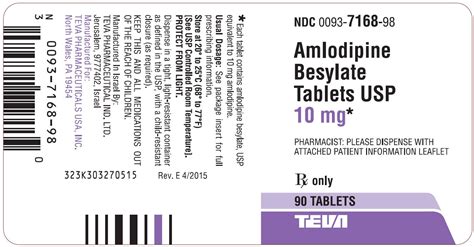Intro
Amlodipine 5mg Tablet Uses: Treats hypertension, angina, and coronary artery disease, lowering blood pressure and relieving chest pain with its calcium channel blocker properties.
Amlodipine 5mg tablets have become a staple in the treatment of various cardiovascular conditions. The importance of understanding the uses, benefits, and potential side effects of this medication cannot be overstated. As a widely prescribed medication, it is essential for patients to be well-informed about the role of amlodipine in managing their health. In this article, we will delve into the world of amlodipine, exploring its uses, mechanisms, and the impact it has on patients' lives.
The prevalence of cardiovascular diseases has been on the rise, affecting millions of people worldwide. High blood pressure, angina, and coronary artery disease are just a few examples of conditions that can have a significant impact on a person's quality of life. Amlodipine 5mg tablets have been shown to be effective in treating these conditions, making them a vital component of modern medicine. By understanding how amlodipine works and its various uses, patients can better navigate their treatment options and make informed decisions about their health.
The use of amlodipine 5mg tablets is not limited to treating cardiovascular diseases. Research has also explored its potential benefits in other areas, such as reducing the risk of stroke and heart attack. As our understanding of this medication continues to grow, so does its potential to improve the lives of patients around the world. In the following sections, we will explore the uses, benefits, and mechanisms of amlodipine 5mg tablets in greater detail, providing readers with a comprehensive understanding of this essential medication.
Amlodipine 5mg Tablet Mechanism of Action

The effects of amlodipine on the cardiovascular system are multifaceted. Not only does it reduce blood pressure, but it also has a positive impact on the heart's workload. By reducing the amount of oxygen the heart needs, amlodipine helps to alleviate the symptoms of angina and other cardiovascular conditions. Additionally, amlodipine has been shown to have a neutral effect on lipid profiles, making it an excellent option for patients with high cholesterol.
Amlodipine 5mg Tablet Uses and Benefits

In addition to these benefits, amlodipine 5mg tablets are also relatively safe and well-tolerated. The most common side effects are mild and temporary, making it an excellent option for long-term treatment. However, as with any medication, it is essential to follow the prescribed dosage and consult with a healthcare professional before starting treatment.
Amlodipine 5mg Tablet Side Effects and Interactions

It is essential to consult with a healthcare professional before starting treatment with amlodipine, especially if you are taking other medications. Amlodipine can interact with certain medications, such as:
- Beta blockers: Amlodipine can increase the effects of beta blockers, leading to excessive lowering of blood pressure.
- Diuretics: Amlodipine can increase the effects of diuretics, leading to excessive fluid loss.
- Anti-arrhythmic medications: Amlodipine can interact with anti-arrhythmic medications, leading to abnormal heart rhythms.
Amlodipine 5mg Tablet Dosage and Administration

Amlodipine can be taken with or without food, but it is recommended to take it at the same time each day to maintain a consistent level of medication in the body. Patients should also be aware of the potential for dose titration, where the dosage is gradually increased or decreased based on the patient's response to treatment.
Amlodipine 5mg Tablet Contraindications and Warnings

Patients with certain medical conditions, such as liver or kidney disease, should also exercise caution when taking amlodipine. Additionally, amlodipine can cause dizziness and lightheadedness, so patients should avoid operating heavy machinery or driving until they are aware of how the medication affects them.
Amlodipine 5mg Tablet Pregnancy and Breastfeeding

Amlodipine is also excreted in breast milk, and its effects on nursing infants are not fully understood. Patients who are breastfeeding should exercise caution when taking amlodipine and consult with their healthcare provider before starting treatment.
Amlodipine 5mg Tablet Overdose and Toxicity

In the event of an overdose, patients should seek medical attention immediately. Treatment typically involves supportive care, such as administering fluids and monitoring vital signs. In severe cases, patients may require hospitalization and close monitoring.
What is the typical dosage of amlodipine 5mg tablets?
+The typical dosage range is between 2.5mg and 10mg per day, taken orally once daily.
Can amlodipine 5mg tablets be used during pregnancy?
+Amlodipine can be used during pregnancy, but only under the close supervision of a healthcare professional.
What are the potential side effects of amlodipine 5mg tablets?
+Common side effects include dizziness, headache, and swelling of the legs, ankles, and feet.
As we conclude our exploration of amlodipine 5mg tablets, it is essential to remember that this medication is a valuable tool in the treatment of various cardiovascular conditions. By understanding its uses, benefits, and potential side effects, patients can make informed decisions about their health and work closely with their healthcare provider to achieve optimal results. We invite you to share your thoughts and experiences with amlodipine 5mg tablets in the comments below, and we encourage you to share this article with others who may benefit from this essential medication.
